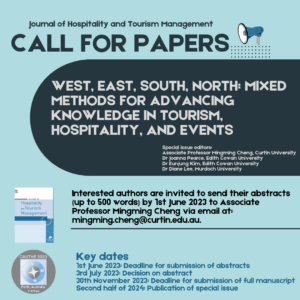Deadline extended CfP: JHTM Special Issue
June 2, 2023

The submission deadline for the special issue of Journal of Hospitality and Tourism Management has been extended until 8 June 2023.
Special Issue
West, East, South, North: Mixed methods for advancing knowledge in tourism, hospitality, and events
Special issue editors
- Associate Professor Mingming Cheng, Curtin University
- Dr Joanna Pearce, Edith Cowan University
- Dr Eunjung Kim, Edith Cowan University
- Dr Diane Lee, Murdoch University
Aim and scope of the special issue
The 33rd Annual Council for Australasian Tourism and Hospitality Education (CAUTHE) Conference was held in February 2023. The conference theme was ‘West, East, South, North: New directions for tourism, hospitality and events research’. One of the core themes of CAUTHE 2023 was to “explore divergence from the common paradigms of tourism and hospitality, and encourage courageous and innovative approaches that help us to rethink and renew tourism, hospitality and events research” (CAUTHE, 2023).
Mixed methods have been widely acknowledged as valuable approaches for attaining a nuanced understanding of a research problem. The strengths of employing mixed methods have been emphasised by tourism scholars and more recently, discussed in the Council for Australasian Tourism and Hospitality Education Conference 2023 as a new way to advance tourism, hospitality and events knowledge. Creswell and Creswell (2017, p. 4) define mixed methods as “an approach to inquiry involving collecting both quantitative and qualitative data, integrating the two forms of data, and using distinct designs that may involve philosophical assumptions and theoretical frameworks.” In this way, mixed method research is able to address complex issues as qualitative and quantitative components are triangulated and thereby offset weaknesses of one method by the strengths of another (Molina-Azorín & Font, 2016).
However, while mixed method design is not new to tourism and hospitality research, its potential has not been fully harnessed. Molina-Azorín and Font (2016) found that 12 percent of the articles published in the Journal of Sustainable Tourism between 2005 to 2014 were mixed method research. While a recent study by Truong, Liu, and Yu (2020) found an upward trend in using mixed methods in tourism and hospitality research over the past two decades, studies employing mixed methods only account for 6.9 percent of articles published in tourism and hospitality journals between 1998 to 2019. In addition, Khoo-Lattimore, Mura, and Yung (2019) reveal that in relation to the mixed method research design, there is a lack of understanding and unveiled confusion in hospitality and tourism fields. As we witness the under-utilization of mixed method design in tourism and hospitality research, it presents a significant opportunity to fully engage with this promising approach to address the complexity and attaining nuanced knowledge of research problems in tourism, hospitality and events.
This special issue aims to advocate the mixed method design in tourism and hospitality research. We expect to receive research papers that are built on solid theoretical foundations, adopt rigorous methodological designs, and include an in-depth comprehension of the paradigms underpinning mixed method research. Sample topics include but not limited to:
- Empirical research that employs mixed method within established tourism, hospitality, and event topics
- Examination of the challenges (e.g., special threats to validity and reliability) and opportunities in conducting empirical research using mixed method research design in tourism, hospitality and events research
- New norms in tourism, hospitality, and events research post-pandemic using the mixed methods
Guidance for contributors
Interested authors are invited to email their abstracts (up to 500 words) by 8th June 2023 to Associate Professor Mingming Cheng.
Authors of accepted abstracts will be invited to submit a full manuscript via JHTM submission system for a double blind peer-review process in accordance with the journal’s submission procedures. Please note that early submissions are welcome and, if accepted, will be available online before the full special issue is printed. Accepted papers are published online without delay, in advance of inclusion in the special issue when it is published online and in print.
Key dates
- **8 June 2023: Deadline for submission of abstracts** EXTENDED DEADLINE
- 3 July 2023: Decision on abstracts
- 30 November 2023: Deadline for submission of full manuscripts
- Second half of 2024: Publication of special issue
References
Creswell, J. W., & Creswell, J. D. (2017). Research design: Qualitative, quantitative, and mixed methods approaches. Sage publications.
Khoo-Lattimore, C., Mura, P., &Yung, R. (2019). The time has come: A systematic literature review of mixed methods research in tourism. Current Issues in Tourism, 22(13),1531-1550.
Molina-Azorín, J. F., & Font, X. (2016). Mixed methods in sustainable tourism research: an analysis of prevalence, designs and application in JOST (2005–2014). Journal of Sustainable Tourism, 24(4), 549-573.
Truong, D., Xiaoming Liu, R., & Yu, J. (2020). Mixed methods research in tourism and hospitality journals. International Journal of Contemporary Hospitality Management, 32(4), 1563-1579.
